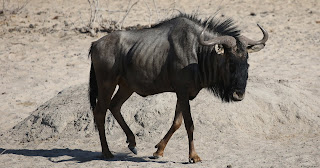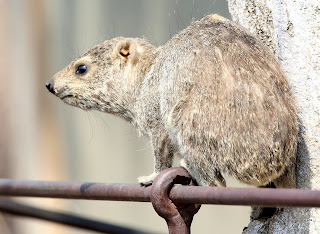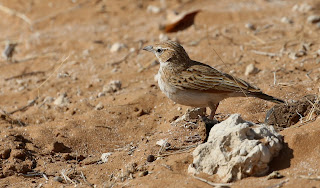We were up before dawn on 28th
August as we had the long drive to Etosha
ahead of us. We left in the dark & hoped to spotlight a good mammal along
the way. However, all was quiet seeing just a Black backed Jackal & a few
Springbok.
Benguella Long billed Lark
Recently split in the Long billed Lark complex.
The bad news is it responds to
Karoo Long billed Lark calls!
We exited the park & after around 20 kms started looking for Benguella Long billed Lark. At our
second spot we found them, at least three birds present & they were singing
& displaying! We then enjoyed a nice breakfast on the side of a nearby
mountain. Then it was time to drive, our first stop being Kaminjab, where we stocked up on groceries, filled up our gas
container, got extra fuel & most importantly topped up our supplies of
wine, gin & beer!
A nice introduction to this wonderful park.
Giraffe & Gemsbok.
Burchell's (Plains) Zebra
Kori Bustard
We entered Etosha National Park
through Galton Gate & drove
eastwards stopping at Jakkalswater & Okawao waterholes. Both had a good
selection of the more normal species present.
We arrived at Olifantsrus, our home for the next six nights & made camp.
Olifantsrus Camp
Looking from the walkway over the camp.
The veld is very dry as the whole area is in the
middle of a drought.
Lion spoor just outside the camp
We arrived at Olifantsrus, our home for the next six nights & made camp.
Blue Wildebeest
Large numbers come to drink here.
Burchell's Sandgrouse
c. 450 came in to drink this morning.
The upper story of the hide gives an unusual view!
Kudu
Red Hartebeest
Plains Zebra
After a taxonomic revision, Burchell's Zebra now
only occurs in East Africa.
Plains Zebra
After a taxonomic revision, Burchell's Zebra now
only occurs in East Africa.
We decided to spend all day of the 29th
in camp, just visiting the excellent hide & chilling out. A good selection
of game came to the waterhole & several hundred Burchell’s Sandgrouse came to drink mid to late morning.
Here he comes!
The problem is they dominate the waterhole,
keeping other species away.
In the early afternoon, four male Elephants turned up & dominated
the waterhole for the next few hours.
Giraffe: always a pleasure to see.
On the 30th we
drove back west via Nomab & Duneveld waterholes. The light was
behind us & was excellent for photography including a Honey Badger who was late going home.
Dolomite Camp is perched high above
the surrounding veld.
This part of the park has been hit hard
by the drought.
White backed & Lappet faced Vulture
Pale chanting Goshawk
Immature Gabar Goshawk
This individual gave really nice close up views.
Female Double banded Sandgrouse
Male
Grey backed Sparrow-lark
We continued past Dolomite Camp to
Klippan & Rateldraf waterholes. Both had a few animals present.
We then
doubled back & spent the hot hours at Dolomite spotting a pair of Damara Red billed Hornbills.
This camp
is in an excellent position on the side of a hill, giving panoramic views.
A
pair of Verreaux’s Eagles flew over
when we were having lunch. A very pleasant spot indeed & worth paying the
premium rates to stay over for a couple of nights.
The recently split Damara Red billed Hornbill
This is a very nice upmarket camp.
A great infinity pool with fantastic views.
Verreaux's Eagle
Rock Hyrax
This is of course, the favourite prey of
Verreaux's Eagles.
A baby!
Gemsbok
Hartemann's Mountain Zebra
This species is quite common in the
western section of the park.
We returned to camp via Jakkalswater
at around 5pm. We visited the hide after dark but without success, as a strong
wind had blown up & we didn’t see one animal!
Eland
Springbok
Namaqua Sandgrouse
Very common in the park
They gave some fabulous views.
Had a bit of a lay in bed on 31st,
venturing out to Tobieron waterhole
in the morning. It was excellent with over 20
Eland present plus all the normal plains game. Also around 2,000 Namaqua & Burchell’s Sandgrouse
came into drink.
Gemsbok
These two were having a bit of a set to!
We returned to camp for lunch & spent the rest of the afternoon in
the hide, enjoying over 100 animals present including Gemsbok, Blue Wildebeast
& Plains Zebra.
A terrible photo, but the only one on our
anniversary of us meeting.
In the evening we opened a bottle of champagne as it was the first
anniversary of Delana & I
meeting! How the year has flown by!
Black Rhino
We then went to the hide in the dark. It was the polar opposite of the
previous night, with four Black Rhinos
present, including two who were having a bit of a pushing match. A couple of
Elephants were also present. But then disaster struck! I fell down the stairs
in the dark hurting my foot in the process. Delana bandaged it up, but hobbling
around in a lot of pain.
Greater Kestrel
Not everyone gets through the drought.
This is an Eland.
We planned to be up early on 1st
September but I was in a lot of pain & it took me a while to get going
& organise myself. We drove west again, the bush looked fantastic in the
morning light but no animals & no birds! It was deathly quiet!
However around 16 kilometers out from the camp, Delana spotted a pair of Lions by the side of the track. We enjoyed great views for the next fifteen minutes. This was a long overdue sighting, as this was out fifth day in Etosha!
Lion
He was very close to the road
& was not happy to see us!
He moved slightly further away.
I think this pair had moved away
from the pride to be alone!
However around 16 kilometers out from the camp, Delana spotted a pair of Lions by the side of the track. We enjoyed great views for the next fifteen minutes. This was a long overdue sighting, as this was out fifth day in Etosha!
Ludvig's Bustard, as usual these shy birds
keep their distance.
Temminck's Courser
Fawn coloured Lark
We continued driving west, stopping at three more waterholes but little
activity. We did see 2 Ludvig’s Bustards
& 9 Temminck’s Coursers. True to form, the bustards were shy & kept
their distance.
Hartemann's Mountain Zebra: it is hard to believe
but this species was once on the verge of extinction.
We enjoyed nice views of a variety of the commoner game species
including some Hartemann’s Mountain
Zebras viewed in excellent light. We would have liked to have lunch at
Dolomite Camp again but I couldn’t manage the steep slope & many stairs, so
reluctantly we headed for home returning around 1.30 pm.
Delana looked after me royally, as I can only hobble around, still in
pain, but seems to be getting better. Spent rest of the afternoon resting in
camp. Hope to be a touch better tomorrow.
Still in a lot of pain on the morning of the 2nd September. Decided to spend the day around the camp.
My foot got less painful as the day progressed. Spent most of the morning in
the hide. Large numbers of Springbok; Burchell’s Zebra & Blue Wildebeast
present. 250+ Burchell’s Sandgrouse came to drink. Otherwise it was quiet. I
whiled away the afternoon hours by deleting & organising my photos. Started
to pack away the camp slowly in the evening. Tomorrow we go to Okaukuejo for a four night stay.
Best birds:
Nothing unusual seen. Only around 80 species recorded, which is very
poor. The long lasting drought & the winter season contributed heavily to
this disappointing total. Only species of note were Ludvig’s Bustard; Damara Red
billed Hornbill & Chestnut
Weaver.
Mammals:
Plains (Burchell’s) Zebra; Hartmann’s
Mountain Zebra; Black faced Impala; Springbok; Kudu; Gemsbok; Steenbok; Red
Hartebeest; Blue Wildebeest; Eland;
Giraffe; Honey Badger; Elephant; Black
Rhino 5; Warthog; Yellow Mongoose; Rock Dassie; Spotted Hyena; Black backed
Jackal; Chacma Baboon; Lion 2.













































































































No comments:
Post a Comment